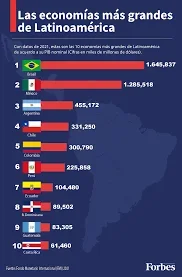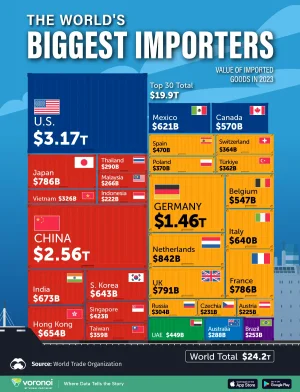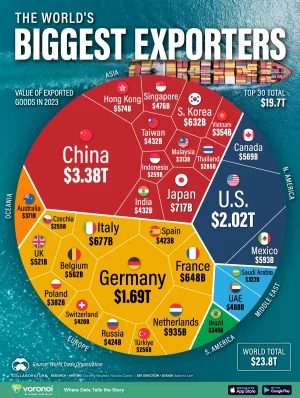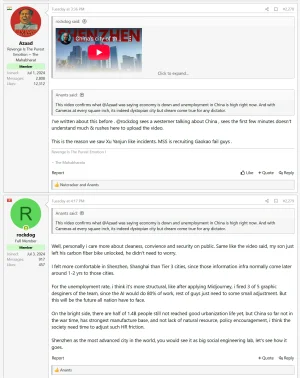For more than two decades, China has developed close economic and security ties with many Latin American countries, including Brazil, Peru, and Venezuela. But Beijing’s increasing sway in the region …

www.cfr.org
View: https://x.com/adam_tooze/status/1674121736038805504?t=EwPow7Q0VBoek7mv09Hz2Q&s=19
Traditional automakers operating in Brazil must ask the Ministry of Development, Industry, Trade and Services (MDIC) to investigate suspicions of unfair competition (dumping) in the operations of Chinese automakers BYD and GWM.
The two sold 76.8 thousand and 29.2 thousand electric and hybrid cars in 2024, respectively. The two volumes represent about 60% of all electrified vehicles that came from abroad and 22.7% of all imported vehicles.
The main target is automobiles, but the automakers must also include brands that sell trucks, buses, agricultural and road machinery.
As explained by the National Association of Automotive Vehicle Manufacturers (Anfavea), there are studies on dumping underway, and the entity defends "free competition and prevention of practices that harm the Brazilian automotive market
As montadoras tradicionais representadas pela Anfavea devem entrar com um processo antidumping contra BYD e GWM.

www.tudocelular.com
Brazilian ports have been clogged with more than 70,000 unsold Chinese electric vehicles this year, a sign of how hard it is for Chinese automakers to maintain their robust growth.
Companies like BYD and GWM have global ambitions, and Brazil has become a crucial proving ground as many other major economies turn to protectionism. The country is the world’s sixth-largest auto market, and success at home could boost prospects across the region.
But after conquering Brazil’s fledgling electric vehicle sector, Chinese automakers are facing increasing challenges. The glut of cars at ports is a result of their efforts to avoid new tariffs. Domestic competitors have responded with additional electric options and investment.
And the country’s electric vehicle growth rates are slowing.
Finding new customers willing to buy an EV in a country that is just beginning to build charging stations is becoming more difficult. In addition to concerns about how far an electric car can travel on a single charge, Brazil is a large country with vast distances between population centers.
“We need to expand our infrastructure,” said Ricardo Bastos, GWM’s director of government relations in Brazil. “Sales are good today, but they have the potential to grow even more if our infrastructure holds up.”
To speed up adoption, BYD and GWM are becoming more aggressive toward 2025. Both are planning to open factories in Brazil.
BYD expects that to happen in March, when its first electric-car factory outside Asia is expected to start producing cars. On the site of a former Ford Motor Co. plant, BYD is investing 5.5 billion reais ($1.1 billion) and expects the plant to be producing 300,000 cars a year within two years.
BYD also said it was doubling the number of dealers it has in the country. They will promote a fleet of about a dozen models. That includes what the company says is the market’s first hybrid pickup truck, which it launched in October. Meanwhile, Great Wall Motor Co., which is expected to surpass $28 billion in sales this year, expects to start operating in May at a former Daimler plant, part of a plan to invest 10 billion reais ($1.6 billion) over roughly a decade. Other Chinese companies have also recently announced plans to expand into Brazil amid a wave of steep tariff barriers in Europe and the U.S. Earlier this year, the Biden administration raised tariffs on electric vehicles imported from China from 25% to 100% to protect the U.S. auto industry from what it said were unfair trade practices.
Plano era conseguir desembarcar os carros e vendê-los antes do impacto do aumento das tarifas

investnews.com.br
The
“Kutsari” project is an initiative by the Mexican government for the development of
semiconductors in the country. This program was announced by
President Claudia Sheinbaum Pardo during the morning press conference on February 6, with the goal of establishing Mexico as a key player in the
design and manufacturing of semiconductors, an essential industry for technological advancement and the global economy.
Mexico has identified semiconductors as a strategic sector for economic growth and technological sovereignty. Currently, the country imports more than
$20 billion worth of integrated circuits annually, primarily for the automotive, medical device, home appliance, and information technology industries.
The Kutsari initiative aims to reduce this dependency and strengthen Mexico’s participation in the global semiconductor supply chain. President Sheinbaum stated that there is already extensive research in Mexico, and the objective now is to coordinate efforts to turn that research into marketable, high-value products
The "Kutsari" project is an initiative of the Mexican government for the development of semiconductors in the country

www.merca20.com
Mexico imposes a 19% increase on products imported from Shein, Temu and Amazon
The measure amounts to a tax of 35% on textile products recently announced by the Sheinbaum Government
The Mexican Government has just brought into force the entry into force of new taxes for products imported through digital platforms.
The Tax Administration Service (SAT) published general rules for Foreign Trade that increase by 19%, from this year, taxes on products shipped from countries without a commercial treaty, including China.
Among the main affected areas are Shein and Temu, giants in the minority market, and with a strong participation in the Mexican market. Amazon and Walmart, for example, will also be affected, however, Americans will benefit from TMEC, the commercial agreement signed between Mexico, Canada and the United States and the tax will be 17% on products whose value is between 50 and 117 dollars. In the case of products between 1 dollar and 50 dollars, the advance will be maintained at 19%.
La medida se suma al impuesto del 35% a los productos textiles que anunció recientemente el Gobierno de Sheinbaum

elpais.com
In 2024, Chile became the third destination for Argentine exports (after Brazil and the United States).
Sales for 6323 million dollars, the trans-Andean country displaced China from third place (the Asian market concentrated operations for US$ 6053 million) and became the same time in the country with which Argentina had the largest trade surplus.

tradenews.com.ar

oec.world

aduananews.com

forbes.co
















